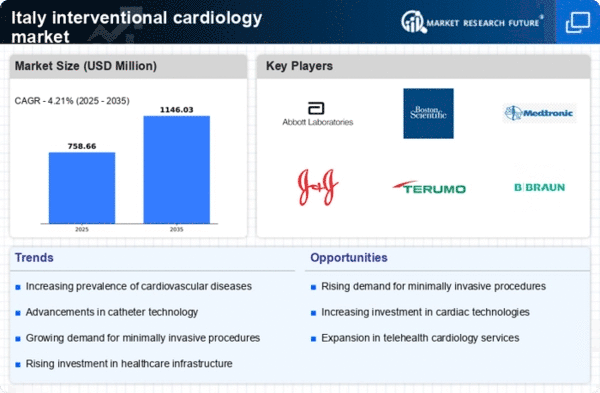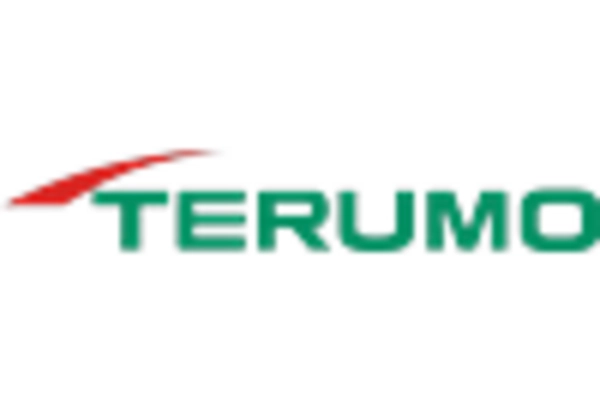Growing Awareness and Education
There is a notable increase in public awareness regarding cardiovascular health in Italy, which serves as a significant driver for the interventional cardiology market. Educational campaigns and initiatives by healthcare organizations have led to a better understanding of the risks associated with cardiovascular diseases. This heightened awareness encourages individuals to seek medical attention earlier, resulting in a greater demand for interventional procedures. Furthermore, healthcare professionals are increasingly educated about the latest advancements in interventional cardiology, leading to improved patient referrals for specialized treatments. Consequently, the interventional cardiology market is likely to experience growth as more patients become informed about their treatment options and the benefits of early intervention.
Supportive Reimbursement Policies
Supportive reimbursement policies in Italy play a crucial role in shaping the interventional cardiology market. The Italian healthcare system provides coverage for a wide range of interventional procedures, which encourages both patients and healthcare providers to opt for these treatments. As reimbursement frameworks evolve to include newer technologies and procedures, the accessibility of interventional cardiology services is likely to improve. This, in turn, may lead to an increase in the number of procedures performed, thereby driving market growth. Furthermore, the alignment of reimbursement policies with clinical guidelines ensures that patients receive timely and appropriate care, reinforcing the importance of interventional cardiology in the overall healthcare landscape.
Investment in Healthcare Infrastructure
Italy's commitment to enhancing its healthcare infrastructure significantly impacts the interventional cardiology market. The government has allocated substantial funding to modernize hospitals and medical facilities, aiming to improve patient care and access to advanced treatments. This investment is expected to facilitate the adoption of cutting-edge interventional cardiology technologies, such as minimally invasive procedures and advanced imaging systems. Additionally, the establishment of specialized cardiac centers across the country is likely to enhance the availability of interventional cardiology services. As a result, the interventional cardiology market is poised for growth, driven by improved healthcare facilities and increased patient access to innovative treatments.
Rising Prevalence of Cardiovascular Diseases
The increasing incidence of cardiovascular diseases in Italy is a primary driver for the interventional cardiology market. According to recent health statistics, cardiovascular diseases account for approximately 35% of all deaths in the country. This alarming trend necessitates advanced interventional procedures, such as angioplasty and stenting, to manage and treat these conditions effectively. The demand for innovative treatment options is expected to rise, as healthcare providers seek to improve patient outcomes. Furthermore, the Italian healthcare system is increasingly focusing on preventive measures and early interventions, which could further bolster the interventional cardiology market. As a result, investments in research and development of new technologies and techniques are likely to increase, enhancing the overall landscape of the interventional cardiology market in Italy.
Technological Innovations in Medical Devices
The interventional cardiology market in Italy is significantly influenced by ongoing technological innovations in medical devices. The development of advanced catheter systems, drug-eluting stents, and imaging technologies has revolutionized the way cardiovascular diseases are treated. These innovations not only enhance the efficacy of interventional procedures but also improve patient safety and recovery times. As manufacturers continue to invest in research and development, the availability of state-of-the-art devices is expected to increase, further driving the interventional cardiology market. Additionally, collaborations between medical device companies and healthcare providers may lead to the introduction of tailored solutions that address specific patient needs, thereby fostering market growth.

















Leave a Comment